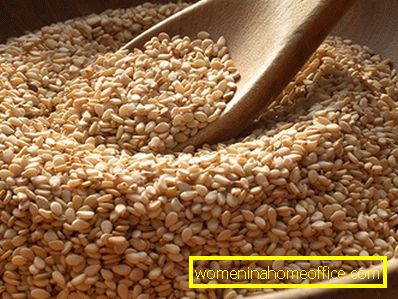Sesame seeds
Sesame. Judging by the name, this is clearly something Eastern. The way it is. Remember the phrase: "Sim-Sim, open"? So, sim-sim is the Arabic version of the word sesame, which is called oilseed, known as sesame. Even the ancient Chinese for 5000 years BC. e. sprinkled their buns with the seeds of this plant. In general, the origin of sesame - a tangled story. But let us leave this riddle for researchers, and we will find out such questions: what did sesame seeds conquer a person with, do they bring benefit or harm to our body?
The composition and caloric content of sesame seeds

Not for nothing sesame oil is called, because its seeds are 60% oil. And if we look at the composition of sesame seeds, it will immediately become clear why a person has been using this plant for thousands of years.
Sesame seed is a real treasure trove, a magical cave filled with useful and healing elements. 100 g dry sesame seeds contain:
- proteins - 19.4%;
- fats - 49.7%;
- carbohydrates - 12.2%;
- fiber - 5.6%;
- saturated fatty acids - 6.6%;
- vitamins, macro and micronutrients.
Nutritional value of sesame seeds - 565 Kcal. The healing properties of sesame oil are determined by the content of such chemical compounds and substances as tocopherol, triglyceride, organic acids and polysaturated. Reducing the content of cholesterol in blood vessels contributes to omega-3 acid (oleic, monounsaturated).
Also, sesame seeds contain such unique phytoestrogens as lignans. They are indispensable for the prevention of cancer tumors, as well as antioxidants in the form of vitamin E. Sesame favorably differs from other plant relatives by the content of methionine (amino acid), which accelerates the processes of tissue repair.
The benefits and harms of sesame seeds, contraindications

Sesame oil is widely used for medical purposes. A large number of different ointments and emulsions contain it in its composition. Sesame increases blood clotting.
The cosmetic industry also does not do without sesame oil and uses it to soften and moisturize the skin, relieve irritation, stimulate the restoration of the skin and its protective properties. The use of sesame seeds helps to strengthen the nails, soft tissues, muscle building. Rubbing sesame oil into the head will heal hair.
Sesame seeds vary in color and are light and black. It is known that black sesame seeds are more useful. If you choose between whole and processed seeds, then preference is better to give the first.
It is rumored that the ancient Indian magicians possessed the secret of the elixir of immortality based on sesame seeds. Encouraged by these rumors, the curious Japanese scientists in the course of research and experiments proved the ability of black sesame to rejuvenate the body cells. Eating black seeds in large quantities and for a long time helps to restore the color of gray hair.
Undoubtedly the benefits of sesame treatment and prevention of anemia, constipation, it also contributes to improved vision. And phytoestrogen contained in seeds is considered an analogue of sex hormones in women, therefore, sesame is simply necessary for ladies of Balzac age.
Sesame seeds are widely used in cooking. Of course, our culinary delights with sesame are limited to sprinkling buns and making kozinaki. But from it you can still cook such delicacies as halva or milk. The inhabitants of the Middle East in many of their recipes use a paste of ground sesame seeds - Tahina. It is added to salads, spices, lemon juice or used as a gravy for hot dishes. Thina is wonderfully combined with eggplants.

Like everything else in our world, sesame seeds are endowed with the properties of natural dualism. Simply put, if there is any benefit from something, then there will definitely be harm, albeit a small one, but still. Sesame has such contraindications:
- it is better not to use it for people prone to thrombosis;
- it is not recommended for those with kidney stones or bladder;
- sesame is better not to eat on an empty stomach, because it irritates the gastric mucosa and can cause nausea and thirst;
- Care should be taken when using sesame in diets.
As has been repeatedly noted, everything is good in moderation: 2-3 teaspoons of sesame seeds per day will be more than enough.
How to take sesame seeds?
So that you can get the most out of the sesame treasures, we have selected some recipes for you:
- chewing a teaspoon of sesame seeds daily will have a beneficial effect on women's health;
- sesame oil should be warmed up to 37 degrees for a couple, rub their breasts with them and wrap them with something warm, preferably with a fluffy scarf - this will relieve cough;
- to clean the body, you need 1 tbsp. l seeds in the form of a hammer to take three times a day before meals, drink plenty of water;
- for the prevention of caries and periodontal disease, it is enough to take a spoonful of sesame oil in your mouth once a day for 5 minutes and perform sucking movements without swallowing.
Selection of sesame seeds and their storage

Choose dry and crumbly sesame seeds. They should not be with a bitter aftertaste. It is advisable to keep sesame in a hermetically sealed container in a cool and dry place - so it can maintain its properties for 3 months. To extend the period, put the sesame in the freezer, and it will last for a year, and just in the fridge - 6 months. Sesame oil is stored for a long time, without losing its properties and without requiring special conditions.
Many often wonder how, with modern medicine and technology, we have such poor health. Everything becomes clear if you look at what we eat - solid flavor substitutes, additives and dyes. Why did we consign to oblivion all the useful things that people ate for thousands of years?